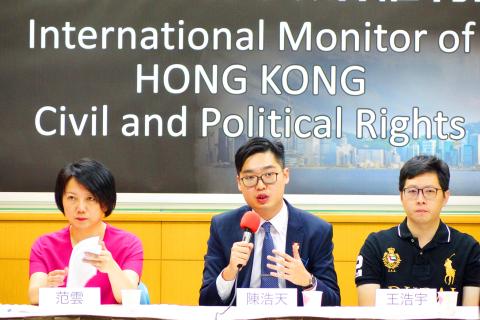Members of several political parties yesterday expressed support for Hong Kong democracy activists facing repression as the International Monitor of Hong Kong Civil and Political Rights Action Group released its first report on civil and political rights in Hong Kong on the 21st anniversary of the territory’s handover to China.
Beijing promised to maintain the “one country, two systems” framework prior to the territory’s handover from Britain in 1997, but continued attempts by the authorities to restrict Hong Kongers’ freedom of speech, as well as civil and political rights, suggest otherwise, Leung Man-to (梁文韜), a member of the group and a political science professor at National Cheng Kung University, told a joint news conference.
The report details the way in which the Chinese government has contravened the framework, preventing pro-independence Hong Kongers from running in elections and ousting two legally elected lawmakers, Sixtus “Baggio” Leung (梁頌恆) and Yau Wai-ching (游蕙禎).

Photo: George Tsorng, Taipei Times
Although Beijing has described Hong Kong’s political issues as China’s internal affairs, the territory is governed by the International Covenant on Civil and Political Rights, which it adopted in 1991 when it was under British rule, Leung Man-to said.
To promote more discussions and collaboration on the territory’s human rights conditions, the group would continue to hold meetings with political groups, academics, activists and civil groups from around the world, and issue more reports, he said.
“Hong Kong is slowly becoming what Taiwan used to be. Things are very bad in terms of human rights and freedom of speech,” Hong Kong Nationalist Party convener Andy Chan (陳浩天) said.
Due to his pro-independence stance, he was banned from running in elections in 2016, as well as participating in rallies, raising funds, opening a bank account or even applying for credit cards, he said.
Beijing wants to destroy Hong Kongers’ self-determination and way of life, New Power Party spokesman Lee Chao-li (李兆立) said.
“The way it has bullied Hong Kongers and ousted their lawmakers shows that it has neither confidence nor integrity. Its promise of maintaining the ‘status quo’ must not be trusted,” Lee said.
Taoyuan City Councilor and Green Party Taiwan convener Wang Hao-yu (王浩宇), Social Democratic Party convener Fan Yun (范雲), Taiwan Solidarity Union member and former lawmaker Chou Ni-an (周倪安), and Flanc Radical member Ho Cheng-hui (何澄輝) also attended the news conference.
Participants jointly condemned Beijing and the Hong Kong government for cracking down on political dissidents and demanded that they release all political prisoners.
They also called on the Taiwanese government and the international community to show support for and assist Hong Kong democracy activists facing repression.
Sixtus Leung, who was released on bail after he was convicted of unlawful assembly in May, was unable to attend, but issued a statement.
Over the past several years, more than 100 Hong Kongers have faced persecution due to their dissenting views, he said.
“While the youngest of them was 15, the oldest was over 70. Most of them do not belong to any parties and are in dire need of support,” he added.
He urged Taiwanese to learn from Hong Kong and “never let Taiwan, which is still enjoying freedom and democracy, to fall into the hands of authoritarian China.”

SECURITY: As China is ‘reshaping’ Hong Kong’s population, Taiwan must raise the eligibility threshold for applications from Hong Kongers, Chiu Chui-cheng said When Hong Kong and Macau citizens apply for residency in Taiwan, it would be under a new category that includes a “national security observation period,” Mainland Affairs Council (MAC) Minister Chiu Chui-cheng (邱垂正) said yesterday. President William Lai (賴清德) on March 13 announced 17 strategies to counter China’s aggression toward Taiwan, including incorporating national security considerations into the review process for residency applications from Hong Kong and Macau citizens. The situation in Hong Kong is constantly changing, Chiu said to media yesterday on the sidelines of the Taipei Technology Run hosted by the Taipei Neihu Technology Park Development Association. With

CARROT AND STICK: While unrelenting in its military threats, China attracted nearly 40,000 Taiwanese to over 400 business events last year Nearly 40,000 Taiwanese last year joined industry events in China, such as conferences and trade fairs, supported by the Chinese government, a study showed yesterday, as Beijing ramps up a charm offensive toward Taipei alongside military pressure. China has long taken a carrot-and-stick approach to Taiwan, threatening it with the prospect of military action while reaching out to those it believes are amenable to Beijing’s point of view. Taiwanese security officials are wary of what they see as Beijing’s influence campaigns to sway public opinion after Taipei and Beijing gradually resumed travel links halted by the COVID-19 pandemic, but the scale of

A US Marine Corps regiment equipped with Naval Strike Missiles (NSM) is set to participate in the upcoming Balikatan 25 exercise in the Luzon Strait, marking the system’s first-ever deployment in the Philippines. US and Philippine officials have separately confirmed that the Navy Marine Expeditionary Ship Interdiction System (NMESIS) — the mobile launch platform for the Naval Strike Missile — would take part in the joint exercise. The missiles are being deployed to “a strategic first island chain chokepoint” in the waters between Taiwan proper and the Philippines, US-based Naval News reported. “The Luzon Strait and Bashi Channel represent a critical access

Pope Francis is be laid to rest on Saturday after lying in state for three days in St Peter’s Basilica, where the faithful are expected to flock to pay their respects to history’s first Latin American pontiff. The cardinals met yesterday in the Vatican’s synod hall to chart the next steps before a conclave begins to choose Francis’ successor, as condolences poured in from around the world. According to current norms, the conclave must begin between May 5 and 10. The cardinals set the funeral for Saturday at 10am in St Peter’s Square, to be celebrated by the dean of the College